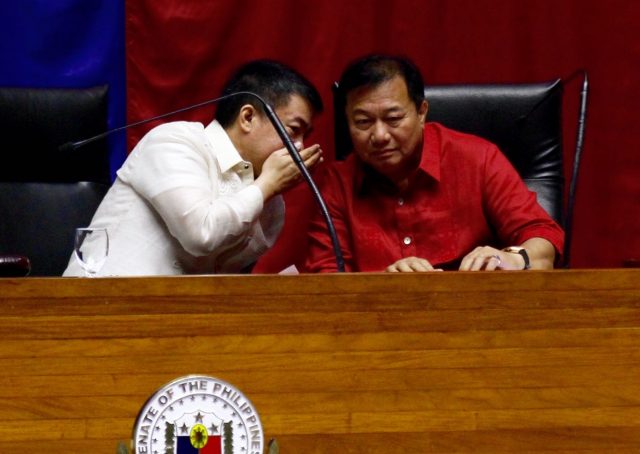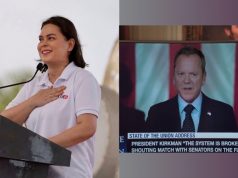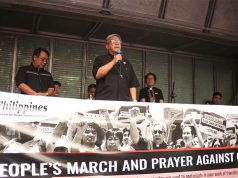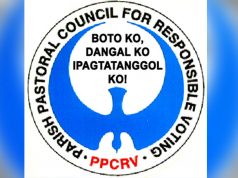
(UPDATE 2, 6:50 p.m) MANILA, Philippines – Talk of a “no election” scenario in 2019 and a possible extension of President Rodrigo Duterte’s term thrust government critics into pseudo-anxiety mode Wednesday, after leaders of the two chambers of Congress, who are both his party mates, left open such a possibility in the prospective transition to federalism, which will involve Charter change.
Malacañang, however, sought to play down apprehension sparked by such, insisting that Duterte will always act with the Constitution as compass.
A leader of the Senate minority, Francis Pangilinan, said evidence abounds that Congress as such cannot be simply trusted with the task of Charter change.
The discussions began when Speaker Pantaleon Alvarez floated a possible no-election scenario in 2019 as the result of constitutional amendments occasioned by the shift to federalism, a key plank of the administration’s legislative reforms.
Asked in a TV interview for comment on increasing speculation that the shift to federalism — which the Speaker said is among Congress’ priorities in 2018 – would involve scuttling the 2019 midterm elections, Alvarez replied: “Anything is possible. You know why? Let’s be practical. Kapag nag-shift ka [when you shift] into a different form of government – unitary to a federal – you’re going to need a transition government.”
Congress, convened as a constituent assembly, cannot just simply approve a draft Charter in May 2018 and then make it take effect immediately, he added.
“There will be a plebiscite, you’ll have to explain that to the public,” Alvarez added, speaking partly in Filipino.
All constitutions, he added, have a transitory provision, citing as example the “Cory [Aquino] Constitution which had a transitory provision governing the case of those elected officials whose terms were to expire.
Some terms expire in 2019, others in 2022, he noted. “In fairness, siguro mas maganda kapag pina-expire mo lahat sa [maybe it’s better if you let them all expire in] 2022, para wala ka nang utang [so you don’t have any carryover]. So, expired lahat ng terms [all terms expire in one blow].”
JOINT VOTING
According to his projected timetable, Alvarez wants Congress to convene into a constituent assembly this January and approve a draft charter that would be submitted for plebiscite in May.
He said he prefers joint voting by the House and the Senate, similar to what they did when they approved the resolution extending martial law in Mindanao last year.
Pimentel and Alvarez are leaders of the President’s party, the PDP-Laban.
The Constitution is silent on whether the House and the Senate, convened together in session, should vote jointly or separately.
It was only for the purpose of approving martial law and its extension when the Constitution specified that a joint voting is required.
Senators have warned that because they are only 24, they would be overruled by the vote of the close to 300 congressmen.
“I’d go for joint voting. Of course, if there is any issue, then there’s the Supreme Court to run to,” Alvarez said.
When sessions resume on January 15, the House is expected to continue plenary debates on a resolution seeking to convene Congress into a constituent assembly. No such discussion is currently happening at the Senate.
He also said it was the job of Pimentel to push for a constituent assembly to revise the constitution, which is a priority of the Duterte administration and their party, PDP-Laban.
“The Senate President has to be there for a joint session,” he said.
PIMENTEL: NOT AN ‘EITHER OR’ SITUATION
Sought for comment, Senate President Koko Pimentel said, however, that the “no-election” scenario “is not an ‘either or’ situation. We can shift to federalism and allow all scheduled elections under the existing constitution to go on and be held.”
Pimentel, a lawyer and Bar topnotcher, said “what is important are the transitory provisions which will govern the terms and duties of those elected in the last election under the 1987 Constitution. And before we can operate under a new constitution, the provisions of the existing constitution must be followed. Hence, if there are scheduled elections under the existing constitution, then this must be followed.”
Asked whether the shift to another form of government might allow Duterte to extend his term as transition president, Pimentel replied that this will depend “on the transitory provisions.”
Things will also depend, he added, “on when we approve the new constitution. If 2019, then the next three years will be the transitory period. We can extend the president’s term: (1) if really necessary and (2) if he’s amenable to it and (3). Since that extension will be part of the new constitution, the new constitution is approved by the people themselves.”
The objective of Charter change, he stressed, is purely “federalism. That’s all,” in an apparent bid to play down speculation that the Charter change might really have the lifting of term limits as the end goal.
Pimentel sidestepped a question on whether he thought Duterte is amenable to a term extension, advising media to refer that query to the President. “Only he can answer that.”
KIKO: CAN WE STILL TRUST CONGRESS ON CHA-CHA?
Senator Francis Pangilinan, Liberal Party president, had a pointed question as his reaction to Alvarez’s pitch for Charter change purportedly for federalism.
In a statement, Pangilinan said: “After witnessing the congressional hearings on extra-judicial killings, on Senator De Lima’s alleged connection with drug syndicates, on the P6.4 billion BoC shabu smuggling scandal allegedly involving the Davao group, the impeachment of Chief Justice Sereno, the approval of the 1-year extension of martial law in Mindanao, the slashing of the CHR budget to P1,000, will you trust Congress with charter change?” (Additional reportage by Lira Dalangin-Fernandez)









